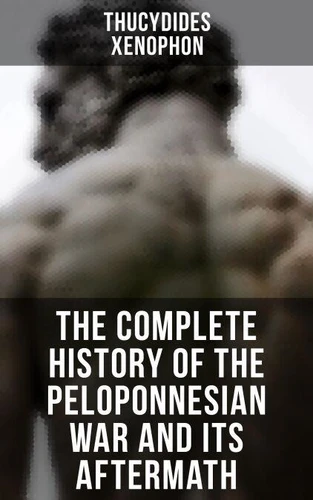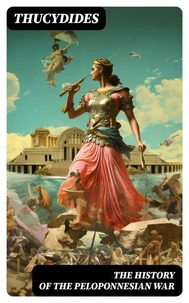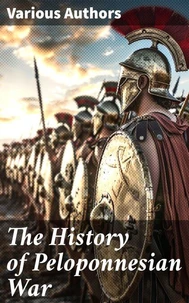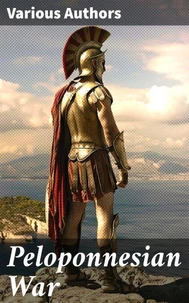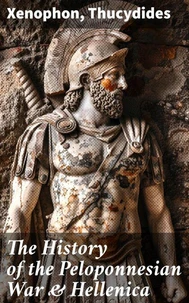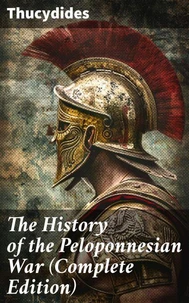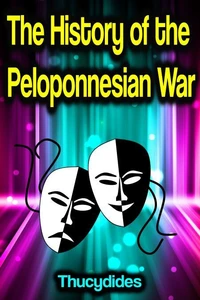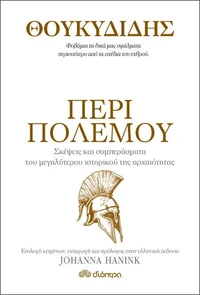The Complete History of the Peloponnesian War and Its Aftermath. The History of the Peloponnesian War & Hellenica
Par : , , ,Formats :
Disponible dans votre compte client Decitre ou Furet du Nord dès validation de votre commande. Le format ePub est :
- Compatible avec une lecture sur My Vivlio (smartphone, tablette, ordinateur)
- Compatible avec une lecture sur liseuses Vivlio
- Pour les liseuses autres que Vivlio, vous devez utiliser le logiciel Adobe Digital Edition. Non compatible avec la lecture sur les liseuses Kindle, Remarkable et Sony
 , qui est-ce ?
, qui est-ce ?Notre partenaire de plateforme de lecture numérique où vous retrouverez l'ensemble de vos ebooks gratuitement
Pour en savoir plus sur nos ebooks, consultez notre aide en ligne ici
- Nombre de pages812
- FormatePub
- ISBN406-4-06-638591-0
- EAN4064066385910
- Date de parution17/12/2020
- Protection num.Digital Watermarking
- Taille929 Ko
- Infos supplémentairesepub
- ÉditeurMUSAICUM BOOKS
Résumé
'The Complete History of the Peloponnesian War and Its Aftermath' offers an unparalleled exploration of ancient historical narrative, capturing the intense dialectic of war and peace as experienced by classical Greece. The anthology weaves together the intricate accounts of Thucydides and Xenophon, presenting a comprehensive panorama of the Peloponnesian War's complexity and its extended echoes through time.
The variety in narrative style-from the meticulous, almost scientific inquiries of Thucydides to the more personalized and philosophical reflections of Xenophon-provides readers with a multifaceted understanding of classical military, political, and social dynamics, highlighting such standout discussions as the plague of Athens and the fall of democracy. The contributing historians are seminal figures in the study of classical antiquity.
Thucydides, known for his critical approach and stringent analysis of causality, offers a stark contrast to Xenophon, whose works embody a more eclectic and arguably subjective perspective. By juxtaposing these historians, the collection not only spans across different phases of the war but also reflects significant shifts within Greek society and thought, underscoring key themes such as power, leadership, and ethical governance.
This anthology is essential reading for anyone interested in the foundational texts of Western historical thought. It provides a rare opportunity to engage directly with the literary craftsmanship and intellectual rigor of two of antiquity's greatest historians. Readers will benefit from the depth of insight into ancient geopolitics and the ever-relevant dialogue on war's impact on humanity. Engaging with these texts allows for a deeper appreciation of how historical narrative shapes our understanding of the past and informs our present.
The variety in narrative style-from the meticulous, almost scientific inquiries of Thucydides to the more personalized and philosophical reflections of Xenophon-provides readers with a multifaceted understanding of classical military, political, and social dynamics, highlighting such standout discussions as the plague of Athens and the fall of democracy. The contributing historians are seminal figures in the study of classical antiquity.
Thucydides, known for his critical approach and stringent analysis of causality, offers a stark contrast to Xenophon, whose works embody a more eclectic and arguably subjective perspective. By juxtaposing these historians, the collection not only spans across different phases of the war but also reflects significant shifts within Greek society and thought, underscoring key themes such as power, leadership, and ethical governance.
This anthology is essential reading for anyone interested in the foundational texts of Western historical thought. It provides a rare opportunity to engage directly with the literary craftsmanship and intellectual rigor of two of antiquity's greatest historians. Readers will benefit from the depth of insight into ancient geopolitics and the ever-relevant dialogue on war's impact on humanity. Engaging with these texts allows for a deeper appreciation of how historical narrative shapes our understanding of the past and informs our present.
'The Complete History of the Peloponnesian War and Its Aftermath' offers an unparalleled exploration of ancient historical narrative, capturing the intense dialectic of war and peace as experienced by classical Greece. The anthology weaves together the intricate accounts of Thucydides and Xenophon, presenting a comprehensive panorama of the Peloponnesian War's complexity and its extended echoes through time.
The variety in narrative style-from the meticulous, almost scientific inquiries of Thucydides to the more personalized and philosophical reflections of Xenophon-provides readers with a multifaceted understanding of classical military, political, and social dynamics, highlighting such standout discussions as the plague of Athens and the fall of democracy. The contributing historians are seminal figures in the study of classical antiquity.
Thucydides, known for his critical approach and stringent analysis of causality, offers a stark contrast to Xenophon, whose works embody a more eclectic and arguably subjective perspective. By juxtaposing these historians, the collection not only spans across different phases of the war but also reflects significant shifts within Greek society and thought, underscoring key themes such as power, leadership, and ethical governance.
This anthology is essential reading for anyone interested in the foundational texts of Western historical thought. It provides a rare opportunity to engage directly with the literary craftsmanship and intellectual rigor of two of antiquity's greatest historians. Readers will benefit from the depth of insight into ancient geopolitics and the ever-relevant dialogue on war's impact on humanity. Engaging with these texts allows for a deeper appreciation of how historical narrative shapes our understanding of the past and informs our present.
The variety in narrative style-from the meticulous, almost scientific inquiries of Thucydides to the more personalized and philosophical reflections of Xenophon-provides readers with a multifaceted understanding of classical military, political, and social dynamics, highlighting such standout discussions as the plague of Athens and the fall of democracy. The contributing historians are seminal figures in the study of classical antiquity.
Thucydides, known for his critical approach and stringent analysis of causality, offers a stark contrast to Xenophon, whose works embody a more eclectic and arguably subjective perspective. By juxtaposing these historians, the collection not only spans across different phases of the war but also reflects significant shifts within Greek society and thought, underscoring key themes such as power, leadership, and ethical governance.
This anthology is essential reading for anyone interested in the foundational texts of Western historical thought. It provides a rare opportunity to engage directly with the literary craftsmanship and intellectual rigor of two of antiquity's greatest historians. Readers will benefit from the depth of insight into ancient geopolitics and the ever-relevant dialogue on war's impact on humanity. Engaging with these texts allows for a deeper appreciation of how historical narrative shapes our understanding of the past and informs our present.

